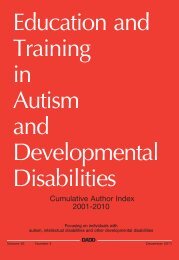Download the Journal (PDF) - Division on Autism and ...
Download the Journal (PDF) - Division on Autism and ...
Download the Journal (PDF) - Division on Autism and ...
Create successful ePaper yourself
Turn your PDF publications into a flip-book with our unique Google optimized e-Paper software.
has been less agreement across professi<strong>on</strong>al<br />
organizati<strong>on</strong>s as to how adaptive behavior deficits<br />
should be evidenced. Adaptive behavior<br />
generally refers to <str<strong>on</strong>g>the</str<strong>on</strong>g> capacity to meet <strong>on</strong>e’s<br />
daily functi<strong>on</strong>al needs based <strong>on</strong> <str<strong>on</strong>g>the</str<strong>on</strong>g> individual’s<br />
age <strong>and</strong> <str<strong>on</strong>g>the</str<strong>on</strong>g> culture in which <str<strong>on</strong>g>the</str<strong>on</strong>g> individual<br />
lives. To determine deficient adaptive<br />
functi<strong>on</strong>ing, some definiti<strong>on</strong>s specify <str<strong>on</strong>g>the</str<strong>on</strong>g> use<br />
of global adaptive behavior composite scores,<br />
o<str<strong>on</strong>g>the</str<strong>on</strong>g>rs specify <str<strong>on</strong>g>the</str<strong>on</strong>g> use of scores reflecting<br />
adaptive domains (e.g., c<strong>on</strong>ceptual, social, <strong>and</strong><br />
practical; AAMR, 2002), <strong>and</strong> o<str<strong>on</strong>g>the</str<strong>on</strong>g>rs specify <str<strong>on</strong>g>the</str<strong>on</strong>g><br />
use of scores reflecting adaptive behavior skill<br />
areas (e.g., self-care <strong>and</strong> community participati<strong>on</strong>;<br />
APA, 2000). However, some definiti<strong>on</strong>s<br />
do not define requirements for deficient<br />
adaptive functi<strong>on</strong>ing. To best evaluate an individual’s<br />
adaptive functi<strong>on</strong>ing from an ecological<br />
perspective, most professi<strong>on</strong>al organizati<strong>on</strong>s<br />
specify that <str<strong>on</strong>g>the</str<strong>on</strong>g> individual’s adaptive<br />
functi<strong>on</strong>ing be assessed in multiple settings to<br />
ascertain <str<strong>on</strong>g>the</str<strong>on</strong>g> pervasiveness of deficient functi<strong>on</strong>ing.<br />
Mental Retardati<strong>on</strong> in <str<strong>on</strong>g>the</str<strong>on</strong>g> Educati<strong>on</strong>al Setting<br />
The Individuals with Disabilities Act (IDEA;<br />
P.L. 108-446, 2004) guarantees a free <strong>and</strong> appropriate<br />
public educati<strong>on</strong> to all students.<br />
C<strong>on</strong>sistent with <str<strong>on</strong>g>the</str<strong>on</strong>g> educati<strong>on</strong>al focus of impact<br />
<strong>on</strong> academic functi<strong>on</strong>ing, IDEA defines<br />
MR as “significantly subaverage general intellectual<br />
functi<strong>on</strong>ing, existing c<strong>on</strong>currently with<br />
deficits in adaptive behavior <strong>and</strong> manifested<br />
during <str<strong>on</strong>g>the</str<strong>on</strong>g> developmental period, that adversely<br />
affects a child’s educati<strong>on</strong>al performance”<br />
(Nati<strong>on</strong>al Archives <strong>and</strong> Records Administrati<strong>on</strong>,<br />
2005, p. 35836). Although <str<strong>on</strong>g>the</str<strong>on</strong>g><br />
federal definiti<strong>on</strong> provides a general framework<br />
for determining eligibility for special educati<strong>on</strong><br />
services under <str<strong>on</strong>g>the</str<strong>on</strong>g> MR category, states<br />
are permitted to refine eligibility guidelines<br />
<strong>and</strong> to operati<strong>on</strong>alize deficient functi<strong>on</strong>ing.<br />
Purpose of <str<strong>on</strong>g>the</str<strong>on</strong>g> Study<br />
Previous studies examining differences across<br />
states’ eligibility criteria for MR under IDEA<br />
have found significant variati<strong>on</strong>s in terms<br />
(e.g., mental retardati<strong>on</strong> <strong>and</strong> mental disability),<br />
use of classificati<strong>on</strong> levels (e.g., mild, moderate,<br />
<strong>and</strong> severe), IQ cutoff scores, <strong>and</strong> adaptive be-<br />
124 / Educati<strong>on</strong> <strong>and</strong> Training in Developmental Disabilities-March 2008<br />
havior c<strong>on</strong>siderati<strong>on</strong> <strong>and</strong> specified criteri<strong>on</strong><br />
(Denning, Chamberlain, & Polloway, 2000;<br />
Frakenberger, 1984; Frakenberger & Fr<strong>on</strong>zaglio,<br />
1991; Utley, Lowitzer, & Baumeister,<br />
1987). This study was designed to provide an<br />
updated examinati<strong>on</strong> of states’ guidelines <strong>and</strong><br />
to investigate two issues that have not received<br />
much attenti<strong>on</strong> in previous surveys.<br />
Despite <str<strong>on</strong>g>the</str<strong>on</strong>g> historical reliance <strong>on</strong> IQs in MR<br />
definiti<strong>on</strong>s, researchers <strong>and</strong> advocates often<br />
assert that <str<strong>on</strong>g>the</str<strong>on</strong>g> over-reliance <strong>on</strong> a single score<br />
ignores <str<strong>on</strong>g>the</str<strong>on</strong>g> complexity of abilities (Daniel,<br />
1997; Horn & Noll, 1997). Research <strong>and</strong> <str<strong>on</strong>g>the</str<strong>on</strong>g>ories<br />
focused <strong>on</strong> cognitive abilities indicate<br />
that important informati<strong>on</strong> about an individual’s<br />
specific cognitive abilities may be overlooked<br />
if <str<strong>on</strong>g>the</str<strong>on</strong>g> focus is <strong>on</strong> <strong>on</strong>ly a single score, an<br />
IQ. Based <strong>on</strong> this reas<strong>on</strong>ing, test authors <strong>and</strong><br />
publishers have drawn increasingly <strong>on</strong> <str<strong>on</strong>g>the</str<strong>on</strong>g>ories<br />
describing specific cognitive abilities during<br />
test development to develop compositebased<br />
part scores representing <str<strong>on</strong>g>the</str<strong>on</strong>g>se abilities<br />
(Alf<strong>on</strong>so, Flanagan, & Radwan, 2005). Recent<br />
guidelines for <str<strong>on</strong>g>the</str<strong>on</strong>g> assessment <strong>and</strong> diagnosis of<br />
MR have also placed greater emphasis <strong>on</strong> part<br />
scores. For example, <str<strong>on</strong>g>the</str<strong>on</strong>g> Social Security Administrati<strong>on</strong><br />
(SSA) released new guidelines in<br />
2002 for disability determinati<strong>on</strong> for MR that<br />
allow certain part scores to be used in place of<br />
<str<strong>on</strong>g>the</str<strong>on</strong>g> IQ in <str<strong>on</strong>g>the</str<strong>on</strong>g> diagnosis of MR when <str<strong>on</strong>g>the</str<strong>on</strong>g>re is<br />
reas<strong>on</strong> to doubt <str<strong>on</strong>g>the</str<strong>on</strong>g> validity of <str<strong>on</strong>g>the</str<strong>on</strong>g> IQ (Nati<strong>on</strong>al<br />
Research Council [NRC], 2002). With<br />
<str<strong>on</strong>g>the</str<strong>on</strong>g> increasing emphasis <strong>on</strong> <str<strong>on</strong>g>the</str<strong>on</strong>g>ory-based test<br />
development <strong>and</strong> interpretati<strong>on</strong>, as well as <str<strong>on</strong>g>the</str<strong>on</strong>g><br />
introducti<strong>on</strong> of <str<strong>on</strong>g>the</str<strong>on</strong>g> SSA guidelines for MR<br />
eligibility that allow use of part scores in certain<br />
situati<strong>on</strong>s, this study investigates <str<strong>on</strong>g>the</str<strong>on</strong>g> prevalence<br />
of intelligence test part score c<strong>on</strong>siderati<strong>on</strong>.<br />
It is well known that some degree of measurement<br />
error is inherent in obtained IQs,<br />
<strong>and</strong> many professi<strong>on</strong>al organizati<strong>on</strong>s specify<br />
that a range of scores (e.g., 70 to 75) or <str<strong>on</strong>g>the</str<strong>on</strong>g><br />
SE M be c<strong>on</strong>sidered in determining deficient<br />
intellectual functi<strong>on</strong>ing. However, <str<strong>on</strong>g>the</str<strong>on</strong>g> federal<br />
definiti<strong>on</strong> of MR under IDEA provides no<br />
indicati<strong>on</strong> that such measurement error be<br />
c<strong>on</strong>sidered in determining eligibility for MR.<br />
Therefore, this study examines <str<strong>on</strong>g>the</str<strong>on</strong>g> use of<br />
score ranges or <str<strong>on</strong>g>the</str<strong>on</strong>g> SE M in determining deficient<br />
intellectual functi<strong>on</strong>ing across states.
















